
Apheresis Program: The Hemapheresis and Transfusion Support (HATS)
Our Therapeutic Apheresis Program offers a wide range of services delivered by a dedicated team committed to delivering top-notch care, while upholding the Hopkins mission of providing the highest quality, safety, and service standards. Alongside our focus on quality patient care, the team is devoted to advancing apheresis medicine through evidence-based practices.
Our Team
Meet our specialized team of skilled physicians, expert nurses with specialized training in therapeutic apheresis and cellular collections, and exceptional staff who assist us in serving both adult and pediatric patients.
Our Apheresis Program offer a wide range of services in line with the guidelines set forth by the American Society for Apheresis (ASFA). These include plasmapheresis/therapeutic plasma exchange, erythrocytapheresis (red cell exchange), lipid apheresis, and therapeutic leukapheresis. Additionally, we perform stem cell collections and apheresis collections for various cell types, such as hematopoietic progenitor stem cells and peripheral blood mononuclear cells, which are crucial for advanced treatments like CAR-T therapy.
In close collaboration with the Sickle Cell Center and the Bone Marrow Transplant (BMT) & Immune Effector Cell (IEC) Programs at Johns Hopkins Hospital, the apheresis service is steadfast in our commitment to advancing patient care through rigorous clinical and research endeavors.
We are committed to education, training, research facilitation, and continuous quality improvement. Moreover, our team actively mentors medical professionals, including transfusion medicine fellows and pathology residents, ensuring proficient application and judicious utilization of therapeutic apheresis techniques.
Apheresis Team

Evan Martin Bloch, M.B.Ch.B., M.S. - Medical Director
Dr. Evan Bloch is an Associate Professor of Pathology at JHUSOM, where he serves as the Associate Director of Transfusion Medicine and Medical Director of the Apheresis Service; he also holds a joint appointment in International Health at the Johns Hopkins Bloomberg School of Public Health... Faculty profile >>

F. Javier Bolanos-Meade, M.D. - BMT Collection Director
As a member of the JH Kimmel Cancer Center, my group's research is focused on finding novel therapies for the treatment of both acute and chronic graft versus host disease (GVHD). To that end, we are developing new strategies for prophylaxis as well as therapies for this problem. We are exploring the use of drugs such as pentostatin in steroid refractory GVHD... Faculty profile >>

Sonja Vozniak, RN BSN - Nurse Manager
Sonja joined Johns Hopkins in May 1995 as an RN2 in the department of Neurology. She joined the HATS department in May 2005 and has been a Lead Clinical Nurse since July 2019.
Apheresis Medical Staff
Aaron A. R. Tobian, M.D., Ph.D.

Aaron Tobian, MD, PhD, is a Professor of Pathology, Medicine, Oncology and Epidemiology at The Johns Hopkins University School of Medicine and Bloomberg School of Public Health. He is also Deputy Director for Clinical Affairs in the Department of Pathology and Director of Transfusion Medicine Division at Johns Hopkins Hospital. Dr. Tobian divides his time between research and clinical service. Faculty profile >>
Herleen Rai, M.D.

Dr. Herleen (Sofi) Rai is an Assistant Professor of Pathology at the Johns Hopkins University School of Medicine and serves as Associate Director of the Clinical Pathology Residency Program. As a faculty member of the Division of Transfusion Medicine, her clinical expertise lies in transfusion medicine and apheresis. Faculty profile >>
Elizabeth Crowe, M.D., Ph.D.

Dr. Elizabeth (Liz) Crowe is an Assistant Professor of Pathology at the Johns Hopkins University School of Medicine. Dr. Crowe serves as the Medical Director of the Blood Bank in the Division of Transfusion Medicine at The Johns Hopkins Hospital. Her areas of clinical practice are in transfusion medicine and therapeutic apheresis. Faculty profile >>
Apheresis Program
Our Services
Patients are accepted by physician referral only.
The HATS Therapeutic Apheresis program supports a number of highly active clinical services and programs at Johns Hopkins Hospital, including Hematology/Oncology, Neurology, BMT Program, Solid Organ Transplantation and approved Clinical Studies.
Our program is staffed with skilled apheresis physicians and nurses committed to providing the highest quality patient care. Quality Assurance programs have been implemented to ensure compliance with regulatory and accreditation requirements, including those of the US Food and Drug Administration, the Maryland Department of Health and Mental Hygiene, The Joint Commission, the College of American Pathologist (CAP) and the Foundation of the Accreditation of Cellular Therapy (FACT).
The Therapeutic Apheresis Program performs the following services for patients seeking supportive treatment for many chronic or acute disorders requiring short- or long-term apheresis:
- Lipid Apheresis
- Therapeutic Plasma Exchange
- Red Cell Exchange
- Stem Cell collections (HPC)
- Clinical / Commercial CAR T-cell collections
- Platelet Depletion
- WBC Depletion
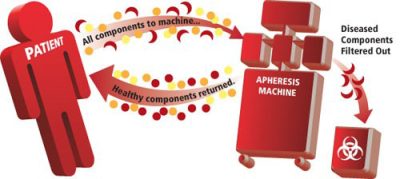
What is Apheresis?
Hemapheresis, (also called Apheresis), is a procedure used in the treatment of a variety of illnesses by which blood is removed from the body and separated into its 4 components: plasma, platelets, white blood cells, and red blood cells. The targeted blood component is then removed and the remaining blood cells, with or without a replacement fluid, are returned to the patient. The removal and replacing of the blood are done simultaneously to maintain proper fluid balance.
Most procedures are performed on an outpatient basis, during normal business hours. However, we have a team of apheresis physicians and nurses on call at any time for patients with urgent medical needs, and can provide apheresis treatment in any location in the hospital.
Learn More About Apheresis
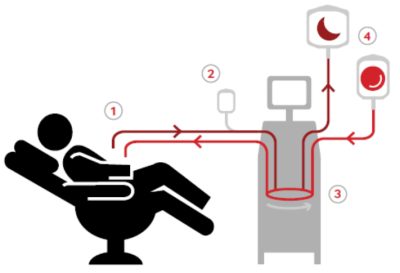
Red Cell Exchanges
Red Blood Cell Exchange, also called RBCX or Transfusion Exchange, is a medical procedure that removes abnormal red blood cells and replaces them with healthy red blood cells provided from blood donors. The blood is removed through needles placed in your arms (1 line removing the blood and the 2nd line replacing the blood simultaneously) or through an intravenous catheter (port, AV Fistula or AV Graft). The blood then circulates through the machine where it is separated into each of its components (red cells, white cells, platelets, and plasma). The separated red blood cells are collected and discarded. The remaining blood are mixed with healthy red blood cells and returned to you.
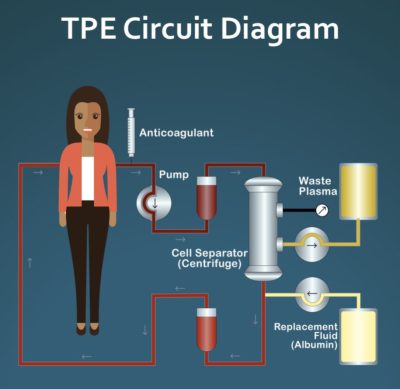
Therapeutic Plasma Exchange
Therapeutic Plasma Exchange, also called TPE, is a medical procedure that separates plasma from whole blood to remove plasma bound antibodies. The blood is removed through needles placed in your arm (1 line removing the blood and the 2nd line replacing the blood simultaneously) or through an intravenous catheter. The plasma is replaced with a colloid fluid, typically Albumin, Saline, or Fresh Frozen Plasma (FFP).
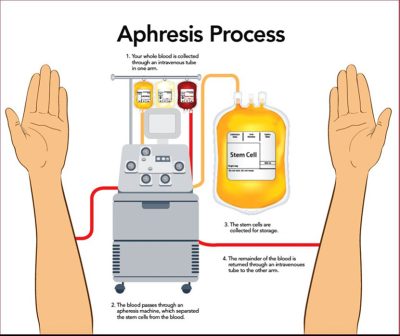
Stem Cell Collections
Types of HATS Apheresis Collections
Autologous HPC: - Mobilization of stem cells from your own bone marrow using growth factor (GSF). The stem cells are collected via apheresis and infused back into you at a later time.
Allogeneic HPC: - Mobilization of stem cells from the donor’s bone marrow using growth factor (GSF). The stem cells are collected via apheresis and infused into a designated recipient.
MNC Apheresis: - A collection of lymphocytes from a donor via apheresis to be infused into a designated recipient.
CAR T-cell: - A collection of lymphocytes from your own peripheral blood via apheresis. The cells are then sent to a manufacturer for processing which are then infused back into you.
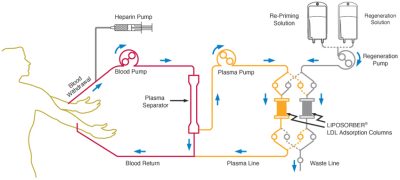
Lipid Apheresis
Lipid Apheresis (also known as LDL apheresis) is a therapy to remove the harmful low-density lipoprotein (LDL) cholesterol that can cause serious health problems, such as cardiovascular disease.
During LDL apheresis, the plasma portion of the blood, which contains cholesterol, is separated and run through a special filtering machine that removes the LDL. Once the LDL is removed, the rest of your blood is returned to you in a continually process.
- Lipid Patient Education (pdf)
- Kaneka Patient Education (pdf)
Make an Appointment
HATS Services
To schedule an appointment for your apheresis procedure or exchange transfusion:
Hours: 7 am – 3 pm (weekdays)
HATS Scheduler: 410-955-6347
Our secure online portal for patients makes it easy to communicate with your doctor, access test results, and more. To access Johns Hopkins Medicine MyChart, click the button below.
Express Testing
No appointment is needed to have samples drawn at Express Testing.
Hours: 7 am – 5:45 pm (weekdays)
Phone: 410-955-1682
Billing and Referral
For billing questions, call 1-855-622-3017.
Patient Referral: If you are Physician looking to refer a patient to the Therapeutic Apheresis Program, call the phone number listed or page the HATS Attending on-call.
Contact Us
Apheresis Program: HATS
Scheduler Phone: 410-955-6347
Apheresis Clinic: 410-955-1717
Days/Hours: Monday – Friday 7AM- 3:30PM
Therapeutic Apheresis Program: HATS
Johns Hopkins Hospital
Department of Pathology & Oncology
1800 Orleans Street
Park Building 150
Baltimore MD 21287
For parking information, visit the Johns Hopkins Hospital Patient & Visitor Parking.
